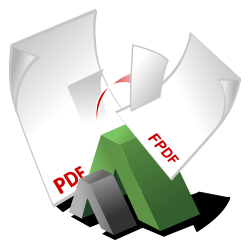PHP
<?php
require_once('tfpdf/tfpdf.php');
require_once('fpdi2/src/autoload.php');
class Pdf extends \setasign\Fpdi\Tfpdf\Fpdi
{
/**
* "Remembers" the template id of the imported page
*/
protected $tplId;
/**
* Draw an imported PDF logo on every page
*/
function Header()
{
if ($this->tplId === null) {
$this->setSourceFile('logo.pdf');
$this->tplId = $this->importPage(1);
}
$size = $this->useImportedPage($this->tplId, 130, 5, 60);
$this->SetFont('DejaVuSansCondensed', 'B', 16);
$this->SetTextColor(0);
$this->SetXY($this->lMargin, 5);
$text = 'tFPDF (v' . tFPDF::VERSION . ') and FPDI (v'
. \setasign\Fpdi\Tfpdf\Fpdi::VERSION . ')';
$this->Cell(0, $size['height'], $text);
$this->Ln();
}
}
// initiate PDF
$pdf = new Pdf();
// Add some Unicode font (uses UTF-8)
$pdf->AddFont('DejaVuSansCondensed', '', 'DejaVuSansCondensed.ttf', true);
$pdf->AddFont('DejaVuSansCondensed', 'B', 'DejaVuSansCondensed-Bold.ttf', true);
// add a page
$pdf->AddPage();
$pdf->SetFont('DejaVuSansCondensed', '', 14);
// Load a UTF-8 string from a file and print it
$txt = file_get_contents('tfpdf/HelloWorld.txt', true);
$pdf->Write(8, $txt);
// Select a standard font (uses windows-1252)
$pdf->SetFont('Arial', '', 14);
$pdf->Ln(10);
$pdf->Write(5, 'The file uses font subsetting.');
$pdf->Output('I', 'generated.pdf');
